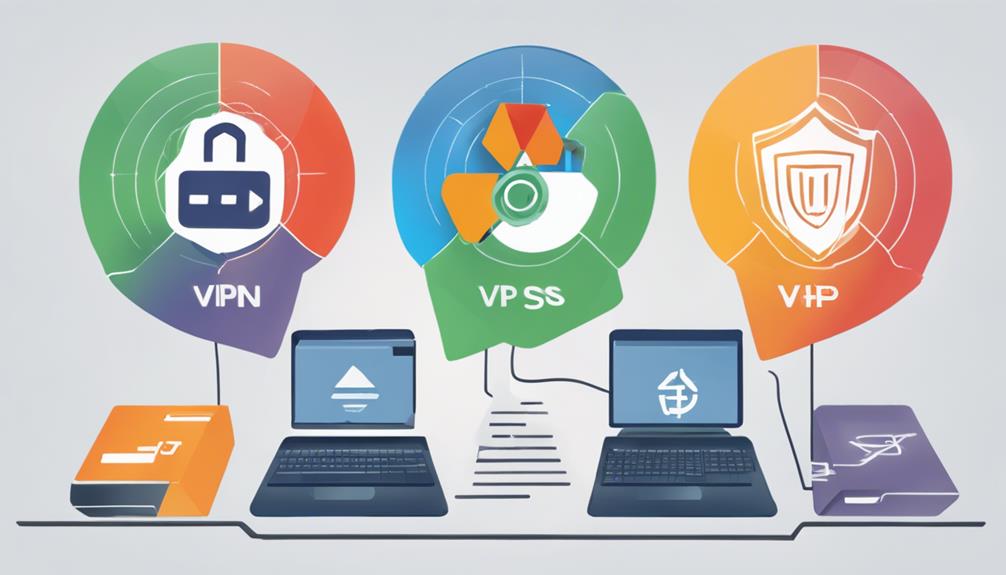Do you think you know all about VPNs? Think again. There are three types of VPNs that serve different purposes, and understanding them is crucial for navigating the world of online security.

2. PIA - Ton of servers world wide, but especially great in United States.***

3. NordVPN - The bigger the better! A great choice everywhere!***

4. ExpressVPN - Trusted by millions in over 180 countries!***

5. SurfShark - Amazing deal right now!***

6. PrivadoVPN - Exclusive deal - Cheapest 1 year deal online - ONLY through this link***

*** Offers money-back guarantee. So try them risk free!
From remote access VPNs to site-to-site VPNs, each type plays a unique role in safeguarding your digital activities.
But what about the third type? Stay tuned to uncover the lesser-known VPN that could change the way you view online privacy.
Remote Access VPNs

Remote Access VPNs enable you to securely connect to a private network from any remote location, ensuring data privacy and encryption. These VPNs are designed to provide a secure connection for users accessing company resources from outside the office. By establishing a Remote Access VPN, you can securely transmit data over the internet, safeguarding sensitive information from unauthorized access.
Users rely on Remote Access VPNs to establish secure connections to their company's network, allowing them to access files, applications, and resources as if they were physically present in the office. This type of VPN plays a crucial role in modern organizations by facilitating remote work capabilities while maintaining data security.
One key protocol used in Remote Access VPNs is the Internet Key Exchange version, which helps establish secure connections between users and the private network. Through Remote Access VPNs, users can securely establish connections to the company's network, regardless of their physical location, ensuring seamless and protected access to essential resources.
Site-to-Site VPNs
Transitioning from Remote Access VPNs to Site-to-Site VPNs, businesses utilize the latter to securely connect multiple fixed sites or networks over a public network like the internet. Site-to-Site VPNs are crucial for ensuring secure communication between different office locations or branches.
Here are some key aspects of Site-to-Site VPNs:
- Encrypted Data Transmission: Site-to-Site VPNs guarantee that all data transmitted between connected networks is encrypted, safeguarding it from unauthorized access.
- Protected Communication: These VPNs establish a protected environment for sharing resources and information between geographically dispersed sites, enhancing overall security.
- Efficient Collaboration: By enabling seamless communication between office locations, Site-to-Site VPNs facilitate efficient collaboration within a distributed organizational structure.
- Network Integration: Site-to-Site VPNs play a vital role in integrating networks across different sites, ensuring smooth operations and data flow within businesses.
Mobile VPNs

Mobile VPNs, designed for mobile devices like smartphones and tablets, ensure secure connections on public Wi-Fi networks. These VPNs play a crucial role in safeguarding data transmitted over mobile networks, protecting sensitive information from potential threats and hackers. By offering encryption and tailored security features, mobile VPNs cater to on-the-go users who frequently connect to public Wi-Fi hotspots. They enable users to access corporate resources securely, enhancing productivity while maintaining data privacy.
One of the primary functions of mobile VPNs is to protect data while users are on the move, ensuring that their sensitive information remains secure. Through the use of encryption and security protocols, these VPNs prioritize data protection, allowing users to browse the internet on their mobile devices without compromising their privacy. Whether you're accessing public Wi-Fi at a coffee shop or traveling for business, mobile VPNs provide a reliable solution to protect your data and maintain a secure connection.
VPN Protocols Overview
When considering VPNs, understanding the various protocols available is essential for optimizing security and performance. Different VPN protocols offer unique advantages in terms of security, speed, and compatibility.
Here's a brief overview of some commonly used VPN protocols:
- OpenVPN: This open-source protocol is renowned for its high cybersecurity standards and ability to bypass firewalls effectively.
- IPSec/IKEv2: Ideal for Windows systems, IPSec/IKEv2 is known for its speed, stability, and strong security features.
- WireGuard: A lightweight protocol designed for speed, making it suitable for activities like downloading, streaming, and gaming.
- SSTP: Secure Socket Tunneling Protocol is another option that provides good security and is often used on Windows platforms.
Each of these VPN protocols has its strengths and weaknesses, so it's important to consider your specific needs regarding security, speed, and compatibility when choosing the right protocol for your VPN connection.
Choosing the Right VPN

Understanding the diverse VPN protocols discussed earlier can help you make an informed decision when choosing the right VPN for your specific needs. Begin by considering the VPN's intended use, whether it's for personal privacy, business security, or remote access to a private network.
Evaluate the available protocols such as OpenVPN, IPSec/IKEv2, WireGuard, SSTP, L2TP/IPSec, and PPTP to match your security and performance requirements. Check the VPN's logging policy to prioritize personal privacy and data protection by selecting a no-logging VPN.

We recommend CyberGhost if you want better streaming (Netflix, Hulu, Amazon Prime, HBO Max, EPSN, Disney+, Eurosport and many others)
Assess compatibility with your devices and operating systems for seamless integration. Compare pricing and features, including server locations, simultaneous connections, and customer support, to find the right balance for your needs.
Whether safeguarding personal information or enhancing business security, choose a VPN that aligns with your priorities for optimal data protection and secure communication.
Frequently Asked Questions
What Are the 3 Most Common VPN Protocols?
When it comes to VPN protocols, the three most common ones are OpenVPN, IPSec/IKEv2, and WireGuard.
VPN Price Comparison 2024
| Company | 1 Month | 6 Months | 1 Year | 2 Year | 3 Year | - |
|---|---|---|---|---|---|---|
| CyberGhost | $12,99 | $6,99 | - | $2,19 | - | Visit Website |
| NordVPN | $11,99 | - | $4,99 | $3,69 | - | Visit Website |
| PIA | $11,99 | - | $3,3 | 2024 Deal right now: $2,03 (Doesn't get cheaper!) | $2,03 | Visit Website |
| ExpressVPN | $12,95 | $9,99 | $8,32 | - | - | Visit Website |
| SurfShark | $12,95 | - | $3,99 | $2,49 | - | Visit Website |
| - | - | |||||
| PrivadoVPN | $10,99 | - | $2,50 | $3,99 | - | Visit Website |
Each protocol has its own strengths and is tailored to different user needs.
OpenVPN is renowned for its security and flexibility, IPSec/IKEv2 is known for being fast and stable, especially on Windows systems, and WireGuard stands out for its speed, simplicity, and security features.
Choose the protocol that best fits your requirements and preferences.
Which Type of VPN Is Best?
When choosing the best VPN type, consider your specific needs, like remote access for individuals, site-to-site connections for multiple networks, or extranets for secure collaboration.
Evaluate factors such as network scale, security requirements, and collaboration nature between entities. Remote access VPNs suit remote employees, site-to-site VPNs benefit businesses with multiple locations, and extranet-based VPNs enable secure collaboration between different organizations.
Pick the type that aligns with your network demands and security goals.
What Are the Three VPN Technologies Defined?
When looking at VPN technologies, it's important to understand the different types available.
Remote access VPNs let users securely connect to private networks from afar.
Intranet-based site-to-site VPNs link LANs in the same WAN for internal communication.
Extranet-based site-to-site VPNs establish secure connections between separate intranets of different organizations.
Each type serves a unique purpose, from individual remote access to secure networking between multiple entities.
What Are Two VPN Types?
When considering VPN types, it's essential to understand the distinctions between various options.
Two common VPN types include:
- Remote access VPNs for individual users connecting from afar
- Site-to-site VPNs for secure connections between fixed locations or networks.
Each type serves unique networking needs and security requirements, ensuring that users or organizations can establish encrypted and protected connections over public networks.
Conclusion
So, now you know the three main types of VPNs:
- Remote Access VPNs
- Site-to-Site VPNs
- Mobile VPNs
Each type serves different connectivity needs, providing secure and encrypted connections for users across various network setups.
Make sure to choose the right VPN for your specific requirements to ensure a safe and reliable connection to remote servers or shared resources.
Stay connected and protected with the right VPN for you!




